- Election Day
|
Post-Election «
Election Integrity
revised
July
27,
2019
A
Threat
to
Our
Democracy:
Is
the
Response
Adequate?
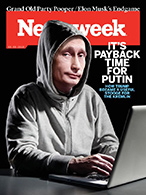 |
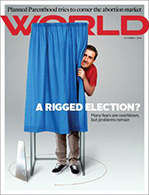 |
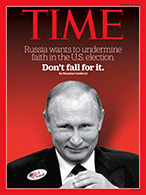 |
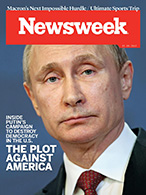 |
| Sept. 9, 2016 |
Oct. 1, 2016 |
Oct. 10, 2016 |
Apr. 21, 2017 |
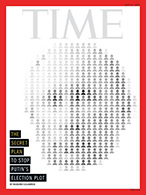 |
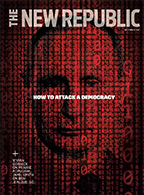 |
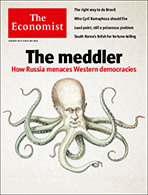 |
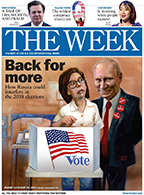 |
| July 31, 2017 | Dec. 2017 | Feb. 24, 2018 |
Aug. 23, 2018 |
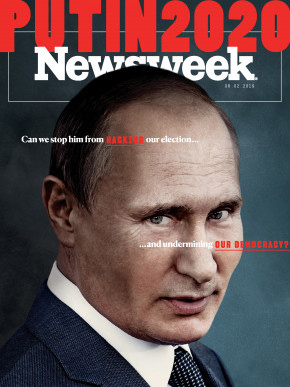 |
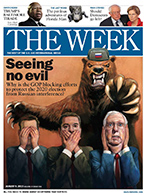 |
||
| Aug. 2, 2019 |
Aug. 9, 2019 |
"We assess
Russian President
Vladimir Putin ordered an influence campaign in 2016 aimed at the US
presidential election... Moscow’s
influence campaign
followed a Russian messaging strategy that blends covert
intelligence operations—such as cyber activity—with overt efforts by
Russian Government
agencies, state-funded media, third-party intermediaries, and paid
social media users or 'trolls.'”
- Intelligence Community Assessment, Jan. 6, 2017
"There should be no doubt that Russia perceives that its past efforts have been successful and views the 2018 midterm US elections as a potential target for Russian influence operations."
- Director of National Intelligence Dan Coats, Feb. 13, 2018
"They’re doing it as we sit here and they expect to do it during the next campaign,”
- Intelligence Community Assessment, Jan. 6, 2017
"There should be no doubt that Russia perceives that its past efforts have been successful and views the 2018 midterm US elections as a potential target for Russian influence operations."
- Director of National Intelligence Dan Coats, Feb. 13, 2018
"They’re doing it as we sit here and they expect to do it during the next campaign,”
-
Former Special Counsel Robert Mueller, July 24, 2019
Russian
measures to influence the 2016 U.S. campaign were multifaceted,
ranging from the hacking and release of politically sensitive emails,
to promulgation of fake news, to targeting state and local election
boards. The Mueller investigation
did not find the Trump campaign colluded with the Russians, but
Russian interference into
elections and politics in America and other democracies is an extremely
serious matter and it is imperative that measures be implemented to
deter future meddling.
The question of how to counteract Russian meddling is complicated because there are so many areas to address, ranging from protecting election systems from hacking to the campaign to create "fake news" and use social media to spread disinformation and misinformation.
Some of the Russian activity became apparent during the campaign, but many details have only emerged and are continuing to emerge as a result of investigations on Capitol Hill and by special counsel Robert Mueller. In July 2016 the hacking and release of the Podesta and DNC emails attracted much attention (1, 2). On Aug. 31, 2016 the Illinois State Board of Elections announced that in July it became aware of "a cyber-attack of unknown origin which targeted the Illinois Voter Registration System database (+)." Other election boards were targeted as well. In the months following the 2016 election, investigations into Russian meddling ramped up. As 2017 progressed, there was a steady drip-drip-drip of Russia related stories, but thus far there has not been a concerted bipartisan response as there was following the 2000 Bush-Gore debacle in Florida.
At the federal level, a key process step was then Homeland Security Secretary Jeh Johnson's designation on Jan. 6, 2017 of election infrastructure as "critical infrastructure." Following up on this, on Oct. 14 an Election Infrastructure Subsector Government Coordinating Council (GCC) was formalized to coordinate between DHS and election officials as well as the private sector. The relationship between DHS and election officials has proved a bit bumpy, but much work is being done by election officials and the private sector to ensure election systems are protected (report).
Perhaps a more challenging or complicated question than how to protect election systems is how to deal with fake news and the use of social media to spread disinformation and misinformation. Social media companies are taking measures, but how effective those will prove remains to be seen.
The absence of leadership or even expressions of concern about Russian meddling from President Trump were very troubling. Trump repeatedly dismissed any possibility that he or his campaign colluded with Russia, calling such charges a "witch hunt," and he claimed vindication following release of the Mueller report. Collusion always seemed a stretch, however. The real issue is ongoing Russian meddling in the U.S. and other democracies.
While Trump ignored and downplayed clear evidence of meddling; at the same time he alleged, without evidence, widespread voter fraud had occurred. For example on Nov. 27, 2016 then President-Elect Trump tweeted: "In addition to winning the Electoral College in a landslide, I won the popular vote if you deduct the millions of people who voted illegally." In Jan. 2017 President Trump claimed 3-5 million illegal ballots had been cast in the 2016 campaign. Trump's administration proceeded with a controversial Presidential Advisory Commission on Election Integrity focusing on voter fraud; the effort proved to be a fiasco and he terminated it in Jan. 2018.
After his infamous performance in the July 16, 2018 press conference at the summit with Russian President Vladamir Putin (+) — with less than four months until the midterm elections — the administration did put a significant public focus on this issue. On Sept. 12, Trump signed executive order. However, he raised concerns when he joked, "Don't meddle in the elections (>)" during a June 27 meeting with Putin at the G20 Summit in Osaka.
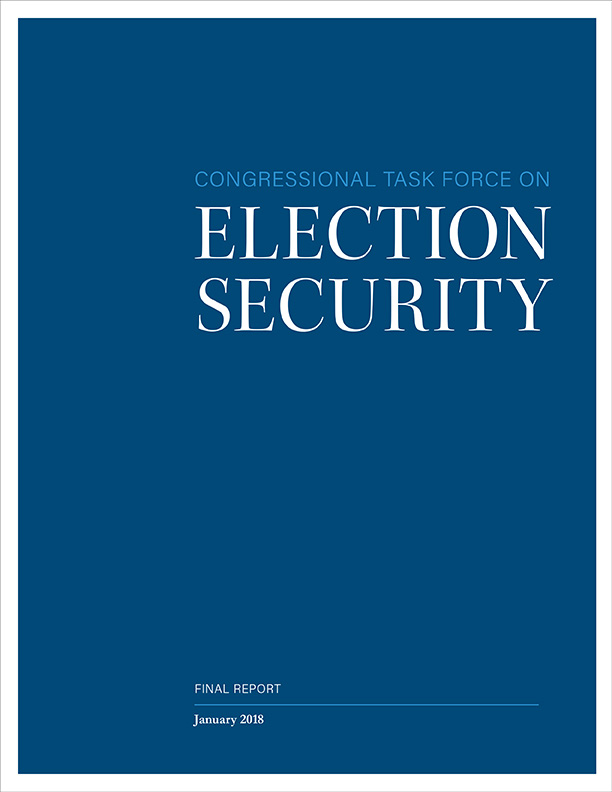 On Capitol Hill a number of bills were introduced
and other activity taken to address election security in the 115th
Congress, but the
bipartisan sense of urgency one might expect on this issue seemed to
be
missing. In June 2017 House
Democrats even
formed their own Congressional Task Force on Election Security.
On Feb. 14, 2018 members of the task force released their report and
recommendations and a bill, the Election Security Act (H.R. 5011),
which would provide more federal resources to the states. In the
Senate bipartisan measures were introduced by
Sens. Amy Klobuchar (D-MN) and James Lankford (R-OK); by
Sens. Marco Rubio (R-FL) and Chris Van Hollen (D-MD); and by Sens.
Lindsey
Graham (R-SC) and Sheldon Whitehouse (D-RI) and Richard Blumenthal
(D-CT). Congress passed nothing in advance of the 2018
midterms.
On Capitol Hill a number of bills were introduced
and other activity taken to address election security in the 115th
Congress, but the
bipartisan sense of urgency one might expect on this issue seemed to
be
missing. In June 2017 House
Democrats even
formed their own Congressional Task Force on Election Security.
On Feb. 14, 2018 members of the task force released their report and
recommendations and a bill, the Election Security Act (H.R. 5011),
which would provide more federal resources to the states. In the
Senate bipartisan measures were introduced by
Sens. Amy Klobuchar (D-MN) and James Lankford (R-OK); by
Sens. Marco Rubio (R-FL) and Chris Van Hollen (D-MD); and by Sens.
Lindsey
Graham (R-SC) and Sheldon Whitehouse (D-RI) and Richard Blumenthal
(D-CT). Congress passed nothing in advance of the 2018
midterms. Having gained control of the House in the midterms, Democrats passed election security legislation (H.R. 2722) by a vote of 225-184 on June 27, 2019. However Senate Majority Leader Mitch McConnell has blocked action on the issue in the Senate.
Resources
U.S. Election Assistance Commission - Election Security Preparedness | Elections - Critical Infrastructure
National Association of Secretaries of State - Election Cybersecurity
German Marshall Fund - Alliance for Securing Democracy
Selected
Press
Releases in Chronological Order
Aug. 15, 2016 - DHS Election Security Call
Sept. 13, 2016 - U.S. House Committee on Science, Space, & Technology Hearing: Protecting the 2016 Elections from Cyber and Voting Machine Attacks
Sept. 14, 2016 - Senator Carper Urges Nation’s Governors to Take Steps to Maintain Confidence in State Election Systems
Oct. 7, 2016 - Joint Statement from the Department Of Homeland Security and Office of the Director of National Intelligence on Election Security
2017
Jan. 6, 2017 - DHS Statement by Secretary Jeh Johnson on the Designation of Election Infrastructure as a Critical Infrastructure Subsector
Feb. 24, 2017 - NASS: States Form Election Cybersecurity Task Force, Call on Federal Government to Rescind "Critical Infrastructure" Designation for Elections
March 20, 2017 - NASS: BRIEFING: Key Facts and Findings on Cybersecurity and Foreign Targeting of the 2016 U.S. Elections [PDF]
June 21, 2017 - U.S. Senate Select Committee on Intelligence Hearing: US Election Security: Russian Interventions and the Outlook for 2018 and Beyond
July 18, 2017 - Belfer Center Launches “Defending Digital Democracy” Project To Fight Cyber Attacks and Protect Integrity of Elections
Dec. 21, 2017 - Klobuchar, Lankford, Harris, Graham Introduce Bipartisan Election Security Bill
2018
Jan. 9, 2018 - Letter from House Ranking Committee Members to Speaker Ryan Charging House Republicans’ With Refusing to Fully Investigate Russia’s Threat to Our Democracy and National Security
Jan. 10, 2018 - U.S. Senator Ben Cardin Releases Report Detailing Decades of Putin's Attacks on Democracy, Calling for Policy Changes to Counter Kremlin Threat Ahead of 2018, 2020 Elections
Jan. 16, 2018 - Rubio, Van Hollen Introduce Legislation To Deter Foreign Interference In American Elections
Feb. 8, 2018 - House Judiciary Democrats Call for Emergency Hearings after Administration Official Reveals Russia Hacked U.S. Voter Rolls in 2016
Feb. 14, 2018 - Election Security Task Force Releases Final Report & Recommendations
March 8, 2018 - Brennan Center for Justice: Almost No Progress in Key Areas of Election System Security in Last Two Years
July 12, 2018 - House Administration Democrats Release New Report on States' Election Security Preparedness
July 16, 2018 - U.S. Election Assistance Commission Announces All Eligible States and Territories Have Requested HAVA Funds
July 17, 2018 - The White House: President Donald J. Trump is Protecting Our Elections and Standing Up to Russia's Malign Activities
July 17, 2018 - Rubio on Passing Bipartisan DETER Act: Russian Meddling Will Happen If We Do Not Deter It From Happening
July 26, 2018 - McCaskill Statement on Report of Attempted Russian Hacking
July 26, 2018 - Letter from Ranking Members of Four Key Committees in the House Requesting a Hearing on Election Security [PDF]
July 27, 2018 - The White House: Statement from the Press Secretary on Election Security
July 31, 2018 - Removing Bad Actors on Facebook
July 31, 2018 - Graham, Whitehouse, Blumenthal Introduce Bills to Prevent Hostile Nations From Undermining American Democracy
Aug. 2, 2018 - The White House: President Donald J. Trump is Strengthening the Security of Our Elections
Aug. 15, 2018 - DHS Hosts National Exercise on Election Security
Aug. 20, 2018 - Microsoft: We are taking new steps against broadening threats to democracy
Aug. 21, 2018 - Facebook: Taking Down More Coordinated Inauthentic Behavior
Aug. 22, 2018 - Klobuchar Statement on Delay of Secure Elections Act Rules Committee Vote
Sept. 12, 2018 - The White House: Executive Order Imposing Certain Sanctions in the Events of Foreign Interference in a United States Election
Oct. 19, 2018 - Joint Statement from the ODNI, DOJ, FBI and DHS: Combating Foreign Influence in U.S. Elections
2019
Feb. 5, 2019 - Acting Attorney General and Secretary of Homeland Security Submit Joint Report on Impact of Foreign Interference on Election and Political/Campaign Infrastructure in 2018 Elections
Feb. 14, 2019 - Wisconsin Elections Commission Wins National Award for Efforts to Secure State-Wide Election Database
Mar. 22-Apr. 18, 2019 - Mueller Report.
June 27, 2019 - Common Cause Hails Vital House Vote, Urges Senate to Take Up Election Security
July 11, 2019 - U.S. Government Officials Participate in Congressional Briefings on Eelction Security
July 18, 2019 - New Report: States Need More Federal Funding to Keep Elections Secure
July 25, 2019 - Senate Intel Releases Election Security Findings in First Volume of Bipartisan Russia Report (+)
It happened...
Presidential Advisory Commission on Election Integrity (May 2017-Jan. 2018) [website]
May 11, 2017 - Executive Order: Establishment of Presidential Advisory Commisssion on Election Integrity
May-July 2017 - Further Developments on the Presidential Advisory Commission on Election Integrity
July 19, 2017 - First Meeting of the Presidential Advisory Commission on Election Integrity
Sept. 12, 2017 - Second Meeting
Jan. 3, 2018 - Executive Order: Termination of Presidential Advisory Commission on Election Integrity
Aug. 3, 2018 - Secretary Dunlap releases initial report on PACEI findings
The 3 to 5 million figure comes from news accounts of Trump's Jan. 23, 2017 reception with congressional leaders at the White House. See: Abby Phillip and Michael DeBonis. "Without evidence, Trump tells lawmakers 3 million to 5 million illegal ballots cost him the popular vote." Washington Post, Jan. 23, 2017.
Also of interest:
House of Commons Library. "Russian interference in
UK politics and society." UK
Parliament, Dec. 21, 2017. [PDF]
Matthew Cole, Richard Esposito, Sam Biddle and Ryan Grim. "Top-Secret NSA Report Details Russian Hacking Effort Days Before 2016 Election." The Intercept, June 5, 2017.

